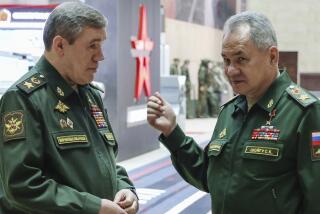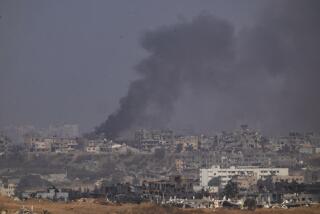Uncertainty as Sudan awaits president’s arrest
KHARTOUM, SUDAN — The billboard in downtown Khartoum delivers a not-so-subtle message to passing cars: “A real Sudanese never stands against a president during his time of need,” reads the text, under a picture of a smiling President Omar Hassan Ahmed Bashir.
As if anyone in the Sudanese capital needed any reminders, an arrest warrant on genocide charges is expected to be issued against Bashir on Wednesday by the International Criminal Court, in a case that threatens to send the country down a path of uncertainty and instability.
Many hope that the war-crimes case stemming from Bashir’s handling of the Darfur conflict in western Sudan will prod the hard-nosed regime into making reforms and ending the six-year war.
But officials and analysts, both inside and outside the country, worry that the case could instead push the ruling party into a more antagonistic, isolationist stance, or even ignite another civil war.
“This is a whole new reality,” said Fouad Hikmat, the Horn of Africa director at the International Crisis Group. “It’s anybody’s guess what happens now.”
The arrest warrant is only the latest dark cloud emerging in what some see as a perfect storm brewing against Sudan’s Islamist-led ruling party, which seized power in a 1989 coup.
National elections this year will test the party’s popular support and could unravel a fragile power-sharing agreement it forged with southern rebels. A new U.S. president has filled his administration with advisors who advocate a get-tough stance toward Sudan. Falling oil prices are bringing the country’s once-thriving economy to its knees.
“This is going to be a decisive year for Sudan -- one that could determine whether the country will survive or not,” said Hayder Ibrahim, founder of the Center for Sudanese Studies, an independent think tank in Khartoum.
The ICC case arose from the government’s counter-insurgency campaign in Darfur. Prosecutor Luis Moreno-Ocampo has accused Bashir of supervising a genocidal plot to wipe out certain tribes in the region. Private militias allegedly funded by the government killed 35,000 people and led to the deaths of at least 100,000 others from hunger and disease, according to the ICC case.
Government officials deny that genocide has taken place and accuse Western nations, chiefly the U.S., of using the ICC to topple an oil-rich Islamic republic with a history of opposing Washington policy in Africa and the Middle East.
“The ICC is targeting Sudan because Sudan is a very rich country,” Sudanese presidential advisor Ali Tamim Fartak said.
How the government responds to the arrest warrant in the coming months, and how the world reacts, will be instrumental in determining Sudan’s future, experts say.
So far, the official government response has ranged from dismissing the case as inconsequential to warning it will increase violence in Darfur and spur attacks against Westerners in Khartoum. Last month, Sudan’s intelligence chief, Salah Abdallah Gosh, said the case might trigger a rise in Islamic extremism.
Diplomats and U.N. officials in Sudan say the government’s next move is unclear, but leaders appear to be leaving all options open, from a peace deal to war.
On the one hand, Bashir, who last fall convened the first-ever national convention to address the Darfur conflict, has opened peace talks with the leading rebel group and has sent diplomatic signals to the U.S. about democratic and humanitarian reforms.
“The time of the rifle is over,” Bashir recently told an audience of opposition leaders.
At the same time, according to a Western diplomat in Sudan, the government has been arming militias throughout the southern and western regions -- the same strategy widely suspected to have been used in Darfur -- just in case rebels or political rivals move against it.
Harassment against opposition leaders, journalists, human rights activists and aid workers has increased substantially over the last six months. One man was convicted in January of treason for allegedly providing information to the ICC. Prominent Islamist Hassan Turabi was jailed after calling on Bashir to turn himself over to the ICC.
But some anti-government activists expressed mixed feelings about the ICC case, which is viewed by many Sudanese as a challenge to the country’s sovereignty.
“I dream about getting rid of the government, but it should come through internal movement, not from the ICC,” human rights activist Azhari Alhaj said. “Having the ICC come in at this sensitive time could have a negative impact, because we are going to be seen as working for the ICC. We are the ones who are going to suffer, and no one in the international community is going to protect us.”
In its lobbying campaign against the ICC, the government has been trying to inflame nationalist sentiments, portraying the case as a “re-colonization” of Sudan and Africa by foreign powers.
But U.S. officials say that beneath the veneer of national unity and public support for Bashir, Sudan’s ruling party is already debating whether its president has become a liability. There are rumors that some of Bashir’s political backers are angling to replace him.
John Prendergast, an anti-genocide activist and Obama administration advisor, said the ruling party had a history of doing what needed to be done to survive.
“They are going to have a serious debate about whether the interests of the ruling party are best served by having [an accused] war criminal as president,” Prendergast said, predicting Bashir would be nudged aside and offered asylum outside the country.
If Sudan were to replace Bashir or agree to reforms, U.S. officials are prepared to allow the ICC case to be deferred by the U.N. Security Council.
“They are going to use the arrest warrant like a loaded gun, but not fire it,” said one U.S. government official who was not authorized to speak publicly. “It’s a way to say, ‘Here is your last chance.’ ”
Others warn such a strategy is fraught with risk. Former U.S. envoy to Sudan Andrew Natsios questioned whether Sudan’s ruling clique would respond to outside pressure.
“We are assuming that they will become more rational,” he said. “But they become more inflexible, more confrontational and more brutal the more they are cornered.”
Natsios warned that the ICC arrest warrant might trigger the collapse of the regime or a return to war, particularly if it distracts from implementation of the 2005 peace treaty that ended the civil war with southern rebels.
“We could end up with another Rwanda or Somalia or Democratic Republic of Congo in which hundreds of thousands of people could be killed,” he said. “We could end up with something much worse.”
--
edmund.sanders@ latimes.com
Special correspondent Alsanosi Ahmed contributed to this report.
More to Read
Sign up for Essential California
The most important California stories and recommendations in your inbox every morning.
You may occasionally receive promotional content from the Los Angeles Times.










